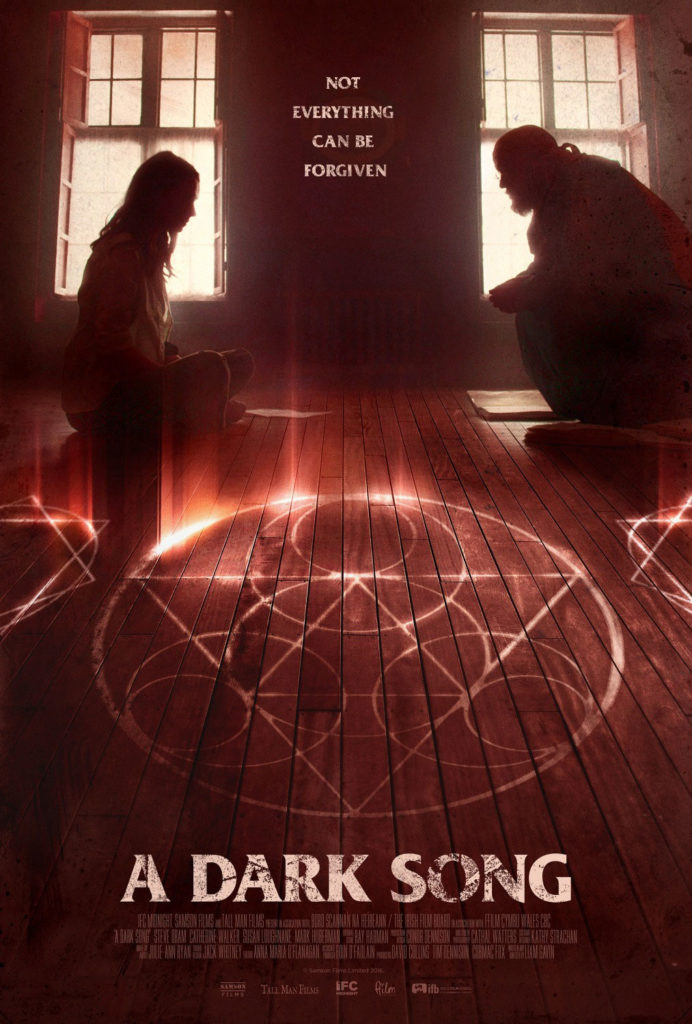Horror films work quite well when they embrace spectacle. Over-the-top gore and special effects are a hallmark of the genre. But splattering blood all over isn’t the only way to make a horror flick. Sometimes a filmmaker goes for the soul underneath the flesh, and makes something disturbing.
A Dark Song is the feature film debut from writer/director Liam Gavin. From 2016, the film tells the story of two people carrying out occult rites in an isolated house in Wales in order to contact a guardian angel. This is no lightweight ritual, either. As occult expert Joseph Solomon (Steve Oram) explains to the woman who hired him to carry out the ritual, Sophia (Catherine Walker), it will be months before they know if it’s working. During that time, the two will not be able to leave the house, nor will they have any contact with the outside world. Nor could they, as there isn’t any power in the house. Or heat. Did I mention this house is in Wales? Because one would not want to live in an unheated house in Wales. All of this makes the stakes quite a bit higher than something one would see in an old Hammer flick.
Why did Sophia hire Joseph to summon her guardian angel? Her son died three years earlier and she desperately wants to contact him, and gets to ask the angel for a favor should the ritual impress it and it agrees to appear. There are deeper motivations, as well. Joseph helps her, not just for the money, but because after Sophia finishes her business with her guardian angel, he gets to ask a favor of his own.
For a good deal of the running time of this film, it is unclear whether or not this film is supernatural at all. It is revealed that Sophia has spent some time in a psychiatric hospital, and at least one person believes she should go back. That makes her belief in the efficacy of occult rituals suspect, at best. As for Joseph, he wouldn’t be the first  huckster to take advantage of someone suffering deep emotional trauma. The way that Joseph treats her after the house is locked, almost as a captive and abused spouse, makes whether or not the ritual is real a very open question. Joseph could be a sick individual who convinced a vulnerable woman to be his prisoner in a remote location for months.
huckster to take advantage of someone suffering deep emotional trauma. The way that Joseph treats her after the house is locked, almost as a captive and abused spouse, makes whether or not the ritual is real a very open question. Joseph could be a sick individual who convinced a vulnerable woman to be his prisoner in a remote location for months.
So, is the ritual the real deal, or is Joseph a sex criminal? I won’t spoil that. One will have to see the movie to find out. The movie is good, so it won’t be a waste of time.
The performances of the two leads carried the film as much as the story. A little more emotion out of Catherine Walker could, perhaps, have served the role better. But, in the end it’s hard to criticize such a professional performance.
Oram was the standout among the two. His character was a time bomb. He seemed like a nice guy, and most of the time he acts like one. But the merest hint of dissent sends his rage rocketing off to the moon. Even in the moments where he’s helping Sophia, he’s abusing her. He makes her totally dependent on his actions and expertise to get her through their days in isolation. For a character with such starkly contrasting moods, Oram brought a lot of subtlety to the role.
A Dark Song stays consistently strong until the waning minutes of the final act. But, even this shift into more familiar horror film territory during the frenetic climax is taut and well done. Ending a film this complex was never going to be easy, no matter who was behind the camera. Such a slight dip is no reason to skip a very dark, and very good, film.
Of final note is the music of Ray Harman. This is a film about evil, and Harman’s score accentuated that evil. It twanged and it bwonged, like so many soundtracks these days, but it did so in its own way. It sounded both metallic and somewhat ancient. As if the images on the screen were not enough, it let the viewer know that nothing good was going on in that house. It’s satisfying to hear a score fit a film so well.
